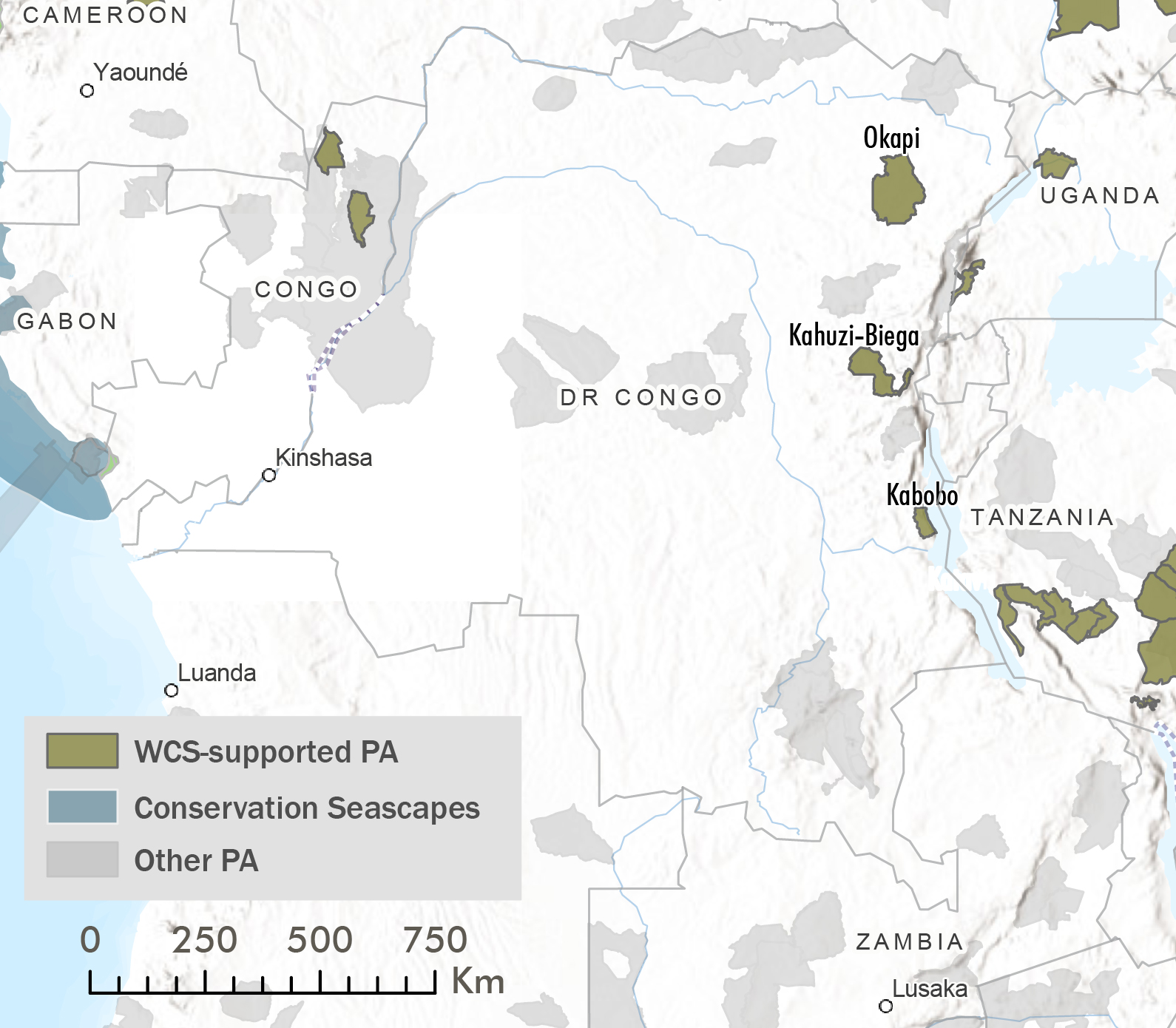Welcome to WCS DR Congo
DRC harbors more than 50% of Africa’s most intact tropical forests and is the most biologically rich country in the continent. It harbors endemic species such as okapi, Grauer’s gorilla, bonobo and the Congo peacock. The Wildlife Conservation Society (WCS) has worked in DRC since the 1950s when Dr. George Schaller undertook the first studies of Mountain and Grauer’s Gorillas in what are now known as Virunga and Kahuzi-Biega National Parks. Today, WCS supports the DRC Government in saving wildlife and wild places in one National Park (Kahuzi-Biega), two Wildlife Reserves (Okapi Wildlife Reserve and Kabobo Wildlife Reserve). In the past, WCS has also supported Salonga, Virunga National Parks, and Itombwe Nature Reserve. Four of the protected areas that WCS supports or supported in the past in DRC are UNESCO World Heritage sites (Salonga, Virunga, and Kahuzi-Biega National Parks, and Okapi Wildlife Reserve).

The WCS DRCongo strategy is articulated around five main pillars namely Governance and Protected Area Management, Law Enforcement and Wildlife Protection, Community Conservation, Research and Biomonitoring, and Sustainable Financing.
Local Communities and Indigenous Peoples are at the centre of our action, not only as active stakeholders but also primary beneficiaries of our conservation efforts. WCS seeks to combine integrity of protected areas and sustainable use of natural resources, to ensure that both ecosystems and communities thrive in a healthy and prosperous environment. This mandate has provided WCS with the opportunity to implement a set of social safeguards in and around protected areas where it currently operates, including Grievance Redress Mechanisms, Free, Prior and Informed Consent, or Gender Mainstreaming./p>
WCS is directly engaged in strengthening capacities in protected areas. To improve law enforcement and adaptive management activities, WCS is spearheading efforts to expand implementation of the Spatial Monitoring and Reporting Tool (SMART) and the Earth Ranger data collection and visualization solution. WCS is also actively supporting eco-guard training in thematics that include combat, information gathering, conflict resolution and human rights. WCS DRCongo has been present in priority landscapes, pursuing wildlife research for over 30 years.
Nationally, WCS has strengthened and supported government and local stakeholders in implementing the national biodiversity conservation strategy, helping DRC gearing up towards the 30x30 commitment to protect and conserve 30% of the planet by 2030, promoting and empowering Local Communities and Indigenous Peoples, and encouraging the general public to adopt alternative behaviors to the unsustainable use of wildlife and plant resources.
The longstanding partnership between WCS and the Ministère de l'Environnement et Développement Durable (MEDD), primarily through the Institut Congolais pour la Conservation de la Nature (ICCN), has expanded over the years. WCS DRC has recently embarked on a new mandate with direct Protected Areas management through public-private partnerships with ICCN for the co-management of the Okapi Wildlife Reserve and the Kahuzi-Biega National Park – promoting a rights-based approach to conservation.
This ambitious project as well as the current growth in activities will require more resources and capacity to better respond to different challenges.